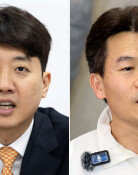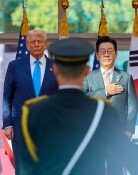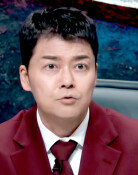[Opinion] `Leadership` Is the Root of Political Corruption
[Opinion] `Leadership` Is the Root of Political Corruption
Posted January. 17, 2002 10:18,
As the winds of the Presidential election gathers strength, should someone say to a person who has put everything on the line to go into politics, `I think there is a lack of leadership` he will certainly anger that person. Runners for the presidency currently chasing the wind will definitely respond by saying, "With this many supporters around, it totally does not make sense to say that we lack leadership." It makes sense that they would react this way since they all assure themselves that they are the ones who have the capacity to lead the nation adequately. I am not suggesting that we discuss here what the heart of leadership entails and what its conditions are. Yet, one thing is clear: the kind of back-alley leadership where one person recruits and lines up a motley crew will not do. Adequate leadership requires going beyond verbal eloquence and understanding the various pitfalls as one moves forward. The present uproar over various corruption scandals is not unrelated to this insight.
As the root of corruption cases comes to light and officials in the Cheong Wa Dae, National Intelligence Service, Public Prosecutors, and National Police Agency resign one by one, the President`s leadership has received a severe blow. At the New Year Press Conference, President Kim said that he was shocked by the successive cases of official corruption and apologized to the nation. The president may very well have felt shock and rage, but things look different from the perspective of the citizens who have seen the true face of the political corruption cases. The president himself is not free from the people`s rage. The president may say that he cannot monitor each subordinate individually and keep track of what they are doing on their own. Then, we ask, why do we need leadership in the first place?
The person who started as a party leader and later became the president must have had personal authority, but he could not have discounted the sacrifice and contribution of his supporters. Moreover, even after his election, the president needs the support of his close aids and core supporters in order to bring together the various interest groups in society and lead the nation. In this regard, the core supporters and close aids help constitute the presidential leadership. There are many political scientists who follow this line of argument. Through this process, collective groups that form the nucleus of presidential leadership has emerged in our political reality. The case of President Kim whose support was concentrated in his region was somewhat unique.
In order to maintain his power, the President cannot afford to alienate this force of core supporters. It is more advantageous to embrace them and take them along for the stable operation of the administration. Political power is by nature prone to create twists and turns, and this fact is a relevant concern for leadership. This is, however, precisely the pitfall of political corruption.
The greatest challenge for the present administration, who won the presidential battle but bore the burden of being a minority and regionalist administration, is magnifying effective leadership. Moreover, it requires the unity of the core presidential supporters. The politics of core supporters is closed and secretive. Before you know it, political comrades have become `our family`. It is in this climate that leadership turns into sympathy relations. Those close aids who are implicated in the scandals at least interpreted this culture of sympathy in a way favorable to them. They must have said to themselves, `I work for the President. This kind of a thing is insignificant.` Another attribute of political leadership is `vagueness`. This mindset suggests that there is no need to set a fire via the opposition party by taking into account every detail – a logic of `don’t shake the boat`. When vagueness and sympathy in leadership come together, the potential for corruption becomes exponentially large. The shoots of political corruption begin sprouting here.
Of course, President Kim would not have appointed these people as presidential secretaries and such if he foreknew that they would be implicated in corruption cases. If that is the case, who is the lead person who pulled them into the core leadership in the first place? The foundation of power is comprised of monopolizing all the resources necessary for running the country, and the most essential part of this is monopolizing information. Does this mean, then, that the invincible intelligence service slumbered during the process of selecting the members of the core leadership in the Cheong Wa Dae, NIS, and Public Prosecutors? The fact that Cheong Wa Dae officials, `the President`s men` have been implicated in the corruption scandals more than once particularly shows that the personnel screening system experienced a serious problem. Or did the influence of recommendation for these individuals override the system? Who, then, made these recommendations and where are they hiding now?
Leadership is one gigantic `director` in the stage of politics. The current administration became too absorbed in this, and the so-called `Prepared President` was not so prepared after all. They tried to establish the leadership hastily, especially by `pouring in` personnel. The result, however, was that you could not heal the nation with home remedies. We are learning this lesson at a very heavy price right now. We have been swept into political corruption scandals because our political leader failed to realize this earlier on.
Choi Kyu-Chul (Editorial Staff Chief)
kihang@donga.com







